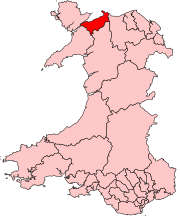| Former Welsh Assembly county constituency | |
|---|---|

| |
| Conwy shown as one of the 40 Welsh Assembly constituencies from 1999 to 2007 | |
| Created: | 1999 |
| Abolished: | 2007 |
| Electoral region: | North Wales |
| Preserved counties: | Clwyd and Gwynedd |
Conwy was a constituency of the National Assembly for Wales from 1999 to 2007. It elected one Assembly Member by the first past the post method of election. It was also one of nine constituencies in the North Wales electoral region, which elected four additional members, in addition to nine constituency members, to produce a degree of proportional representation for the region as a whole.[1]
Boundaries
editThe constituency was created for the first election to the Assembly, in 1999, with the name and boundaries of the Conwy Westminster constituency. It was partly within the preserved county of Clwyd and partly within the preserved county of Gwynedd.[2]
The other eight constituencies of the region were Alyn and Deeside, Caernarfon, Clwyd South, Clwyd West, Delyn, Vale of Clwyd, Wrexham and Ynys Môn.
The Conwy constituency was replaced for the 2007 Assembly election. Its area became partly within the Arfon constituency, and partly within the Aberconwy constituency. Arfon is entirely within the preserved county of Gwynedd and Aberconwy is entirely within the preserved county of Clwyd. Both of these constituencies are in the North Wales electoral region. For Westminster purposes, the new constituency boundaries became effective from the 2010 United Kingdom general election.[3]
Voting
editIn general elections for the National Assembly for Wales, each voter has two votes. The first vote may be used to vote for a candidate to become the Assembly Member for the voter's constituency, elected by the first past the post system. The second vote may be used to vote for a regional closed party list of candidates. Additional member seats are allocated from the lists by the d'Hondt method, with constituency results being taken into account in the allocation.[4]
Members of the National Assembly for Wales
edit| Election | Member | Party | Photo | |
|---|---|---|---|---|
| 1999 | Gareth Jones | Plaid Cymru | ||
| 2003 | Denise Idris Jones | Labour | ||
| 2007 | constituency abolished; see Arfon and Aberconwy | |||
Election Results
edit| Party | Candidate | Constituency | Regional[5] | |||||
|---|---|---|---|---|---|---|---|---|
| Votes | % | ±% | Votes | % | ±% | |||
| Labour | Denise Idris Jones | 6,467 | 30.9 | +0.8 | 6,462 | 30.9 | +0.2 | |
| Plaid Cymru | Gareth Jones | 6,395 | 30.6 | 0.0 | 5,283 | 25.3 | -5.1 | |
| Conservative | Guto Bebb | 5,152 | 24.6 | +6.1 | 4,671 | 22.3 | +3.4 | |
| Liberal Democrats | Graham Rees | 2,914 | 13.9 | −2.6 | 2,575 | 12.3 | -3.1 | |
| Green | 725 | 3.5 | +0.9 | |||||
| UKIP | 549 | 2.6 | New | |||||
| John Marek Independent Party | 408 | 2.0 | New | |||||
| Cymru Annibynnol | 130 | 0.6 | New | |||||
| Communist | 79 | 0.4 | +0.2 | |||||
| ProLife Alliance | 30 | 0.1 | New | |||||
| Majority | 72 | 0.3 | N/A | |||||
| Turnout | 20,928 | 38.4 | −10.8 | |||||
| Labour gain from Plaid Cymru | Swing | +0.4 | ||||||
2003 Electorate: 55,291
Regional ballots rejected: 273
| Party | Candidate | Constituency | Regional | |||||
|---|---|---|---|---|---|---|---|---|
| Votes | % | ±% | Votes | % | ±% | |||
| Plaid Cymru | Gareth Jones | 8,285 | 30.6 | N/A | 8,306 | 30.4 | ||
| Labour | Cath Sherrington | 8,171 | 30.1 | N/A | 8,383 | 30.7 | ||
| Conservative | David Jones | 5,006 | 18.5 | N/A | 5,171 | 18.9 | ||
| Liberal Democrats | Christine Humphreys | 4,480 | 16.5 | N/A | 4,189 | 15.4 | ||
| Independent | Goronwy Edwards | 1,160 | 4.3 | N/A | ||||
| Green | 715 | 2.6 | ||||||
| Natural Law | 312 | 1.1 | ||||||
| Socialist Alliance | 118 | 0.4 | ||||||
| Communist | 68 | 0.2 | ||||||
| Rhuddlan Debt Protest Campaign | 26 | 0.1 | ||||||
| Majority | 114 | 0.5 | N/A | |||||
| Turnout | 27,102 | 49.2 | N/A | |||||
| Plaid Cymru win (new seat) | ||||||||
See also
editReferences
edit- ^ "Elections (Wales)". politics.co.uk. Retrieved 14 April 2020.
- ^ Criddle, Byron; Waller, Robert (2007). The Almanac of British Politics. Routledge. p. 258. ISBN 978-0415378239.
- ^ Assembly Constituencies and Electoral Regions National Assembly for Wales, Jan. 2007. Accessed 14 April 2020
- ^ Altunbas, Yener (2002). Public Choice. Vol. 111, No. 1/2. Springer. pp. 185–193.
- ^ The National Assembly for Wales elections 2003. The Electoral Commission. November 2003. pp. 110–115. Retrieved 1 August 2021.
- ^ "National Assembly for Wales Elections (Constituency) 1999 - Thursday, 6 May 1999". National Assembly for Wales. Retrieved 14 April 2020.